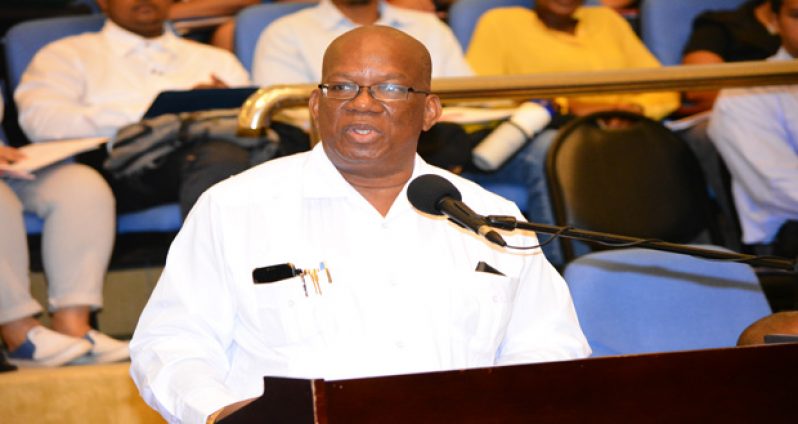GOVERNMENT has committed itself to reforming the public procurement system here, promising a more open, competitive and transparent process that will not encourage corruption. Allegations of corruption and favouritism have dogged the procurement system in this country for years. Speaking at a procurement symposium on Monday, Finance Minister, Winston Jordan also sent a strong message to opposition forces, saying that Government, despite attempts, will never allow “loose lips and idle tongues” to dissuade it from transforming the economic landscape of the country.

Addressing the conference Jordan said it was convened at a time when there are “all kinds of loose talk” about the slowdown in the economy and a possible economic crisis which can lead to a recession. “I say, be wary of their loose talk. Be conscious of the old adage: Loose lips sink ships,” Minister Jordan said he as sounded a warning.
He added, “Those loose lips, those idle, ill-informed talk, are attempting to sink the country’s economy with the hope of bringing the Government to its knees,” but he made it clear that the A Partnership for National Unity + Alliance for Change (APNU+AFC) Government will never allow “loose lips and idle tongue” from applying a fresh approach to the management of the economy.
In a couple of days, the Government will mark six months in Office and despite the many challenges, Minister Jordan said it will continue to lay the foundation and set the stage for rapid progress over the coming years.
“Our attainment of transparency and accountability is being built on the mountain of good governance…it is about being more dynamic…and this dynamism can be best brought about by changing the way we do business,” the Minister said.
Hence going forward, Minister Jordan said the Government will be changing the way it does business, particularly in the procurement and tendering process, noting that it will be more open, competitive and transparent.
“This new approach that we seek will have many positives for our economy.” the Finance Minister stated, positing that it will help to tackle the issue of waste and simultaneously control public spending.
He pointed out that the broken tender and procurement system, which the Government inherited, had fostered an environment of unfairness and inequality with many allegations of corrupted behavior in the public procurement process.
These allegations range from sole sourcing, contract splitting, inflated engineering estimates, evaluation bias and use of inexperienced contractors to the absence of competitive bidding in many cases. Overpayment and the lack of a formal bid protest committee were also among some of the concerns raised. “The system breeds suspicion and distrust, and it has to be fixed,” Minister Jordan emphasised.
In light of these allegations, the Finance Minister said that the National Procurement and Tender Administration Board (NPTAB) was working assiduously to dispel those perceptions by promoting fairness, openness and transparency, thereby restoring trust and confidence in the system.
Already, the NPTAB has been seeing positive changes. According to Minister Jordan, contractors who had ceased tendering in the past were now returning to the system. Additionally, it was pointed out that more contractors and stakeholders now felt free to make complains which were now being heard at the national level while positive steps were being taken to remove the barriers contained in existing contract documents that stymie the entry of new contractors and the involvement of small businesses.
Meanwhile, the National Procurement and Tender Administration (NPTA) has been established and reports directly to the Finance Minister awaiting the establishment of the Public Procurement Commission (PPC). With the establishment of the PPC, Cabinet’s involvement in the tendering and procurement process will be phased out.
Additionally, the Minister pointed out that the NPTA was working in conjunction with the Inter-American Development Bank (IDB) to assist in the modernization of the public procurement process. Revision of the public procurement regulations, establishment of a process of debarment and reporting complaints in compliance with national and international standards and review of the Public Procurement Act to reflect the electronic mode of operations are among interventions being made. Minister Jordan made it clear that those steps were being taken to cut the red tape and bureaucracy that seemed destined to eliminate a large body of small contractors.
Meanwhile, NPTAB Chairman Berkley Wickham said the symposium was being held at a time when order was being restored even as steps are being taken to modernise the procurement process in the country. He said issues of corruption and favouritism were among the ills that have been associated with the procurement process, but said “those ills have no place in a modern procurement process.”
He contended that over the years, Guyana had moved further and further away from the objectives outlined that piece of legislation, stressing that the legislation must be the center of procurement activities in Guyana. “We have to come out of that mode of backwardness…We are going to establish a tradition of fair play, level playing field, transparency and integrity.”
During the symposium, the role of the Small Business Bureau in supporting the growth and sustainability of micro and small business enterprise in Guyana, and NIS compliance were among some of the areas covered.
By Svetlana Marshall





.jpg)








